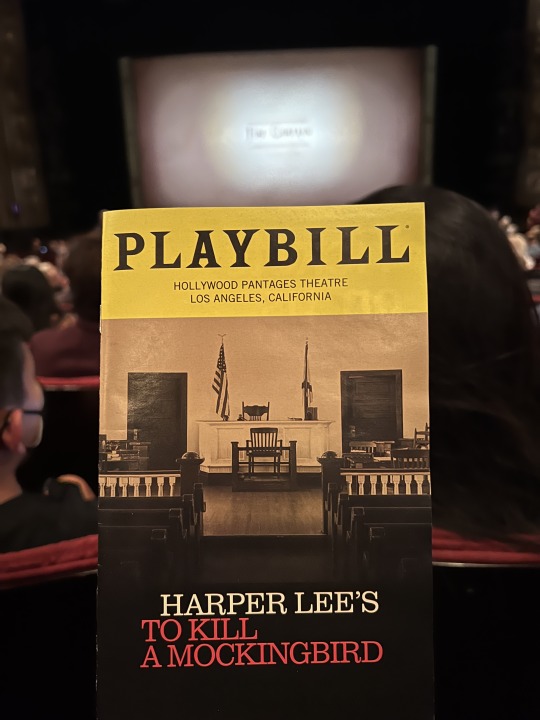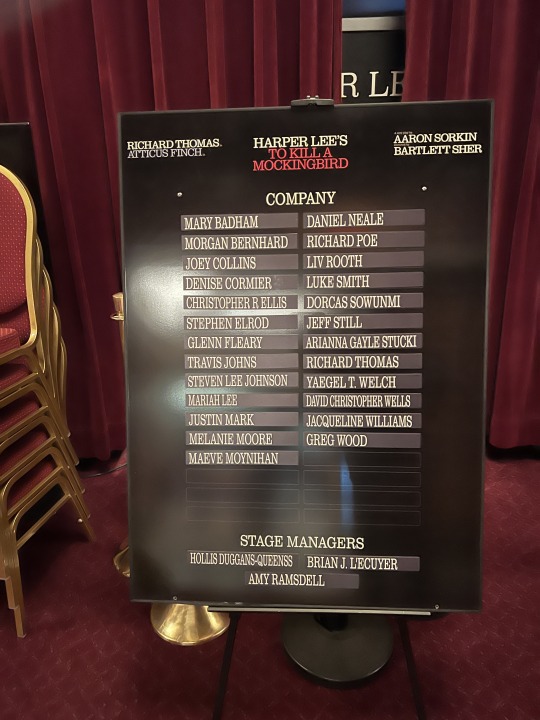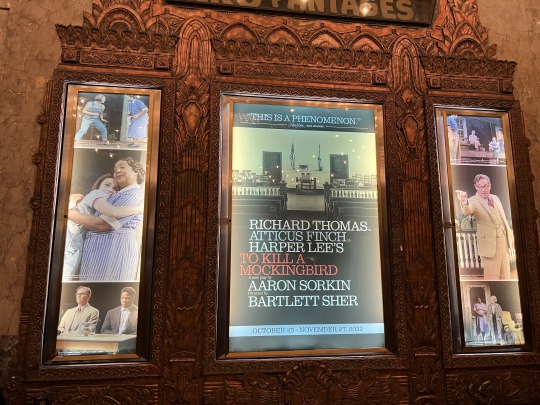#sara holdren
Explore tagged Tumblr posts
Text

The cast and director of As You Like It at Shakespeare at Notre Dame.
9 notes
·
View notes
Text
"Ward’s big innovation is, between Acts One and Two, to stage the play’s subtitular dance [pas de deux]" Vulture review by Sara Holdren
"Jeff and I have gone to see a lot of plays together. We would often have the same opinion and we’ve always sort of had the same goal or the same desire of what we’ve been craving to see in theater. So I knew, for what he lacked in maybe experience as a theater director, I think he more than makes up for in just his love for it and his taste." - Christopher Abbott's interview for Vogue
"Shanley is a romantic, and in Ward’s production, the more tender moments are among the strongest." - Vulture.com
"Ward is making his directorial debut with this work and he proves his mettle with a deep understanding of his characters’ motivations and their shared suffering. As an actor himself, it’s easy to see why he chose to direct this piece. With so much to chew on, it’s a feast for actors. But it’s also quite a big challenge in the way that the whole thing could so easily turn melodramatic. In Ward’s hands, despite the high level of intensity in the writing, it all rings true." - NY Stage Review by Roma Torre
"Director Ward tries to add theatrical heft with a sort of pincer maneuver: he dresses the two locations in granular realism and transitions between sections using the abstract language of dance. It’s a bold move that makes sense—reinforcing the sordid solidity of the material world but releasing emotions in movement and music." - Observer review by David Cote
'Danny and the Deep Blue Sea' reviews about Director Jeff Ward 🖤
#danny and the deep blue sea#jeff ward#christopher abbott#off broadway#reviews#just spreading the love#<333333
15 notes
·
View notes
Text
Jonathan Groff's Broadway performance called 'thrillingly fierce ... unmissable'; a roundup of critics' reviews of 'Merrily We Roll Along'
Mary Ellen Wright
Lancaster County native Jonathan Groff is receiving some rave reviews from major critics for his performance in the Broadway revival of the Stephen Sondheim musical, “Merrily We Roll Along,” which officially opens today, Tuesday, Oct. 10, and had its red-carpet celebration Sunday at the Hudson Theatre.
Jesse Green of the New York Times calls Groff’s performance “thrillingly fierce.”
Though Green feels the show is “underscaled” for Broadway, and has problems with the book of the show feeling “Frankensteined” with parts that are “coarsely sutured and don’t quite line up,” he gives kudos to the three leading players.
“... Radcliffe’s wit and modesty, combined with Mendez’s zing and luster, provide perfect settings for what is now (as it has never been previously) the inarguably central performance. Groff, always a compelling actor, here steps up to an unmissable one.
“With his immense charisma turned in on itself, he seems to sweat emotion: ambition, disappointment and, most frighteningly, a terrible frozen disgust,” Green adds.
“Groff ... has never been better than he is here, imbuing a tricky character with tearful sincerity and charm.” says Patrick Ryan of USA Today. “Mendez is a hilarious knockout as the acerbic Mary, bringing powerhouse vocals and aching vulnerability ... . As Charley, Radcliffe is the tender, open heart of ‘Merrily’ ... and infuses his stubborn lyricist with brio and palpable hurt.”
“Groff’s transformation-in-reverse is a perceptive journey ... from remorseful Hollywood sellout to star-struck starving artist, pressing his nose up against the window of fame and riches,” says Peter Marks of the Washington Post.
Chris Jones of the Chicago Tribune, who says Mendez’s Mary character comes off as the lead character in this production, says “Groff, whose singing and energy drive the show, is ... superb: his character refuses to see plenty of stuff, but the denials clearly show on Groff’s face, and in his voice.
“Broadway never saw a better triple-act” than the three leads,” Jones says, calling the revival “gorgeous.”
In some of the reviews, British musical theater star Maria Friedman has been credited with retooling the show to resurrect it as a hit.
The show, which is now scheduled to run until March 24, played off Broadway last year.
“Groff, Mendez, and Radcliffe create a Frank, Mary, and Charley that burst with energy,” says TheaterMania’s David Gordon. “They’re giving career-best performances, and you not only buy them as friends, but palpably sense their joys and crushing disappointments.
“... Groff beautifully grounds Frank in the reality of a man who has gotten everything he wanted, only to realize that the most important things in his life have completely disappeared,” Gordon adds.
Groff, who combines the looks and charisma of a young matinee idol with tender sensitivity, is the ideal Frank — someone who everyone else can’t help but fall in love with, which is why his pals self-destruct when Frank loses his way,” writes Matt Windman of AMNY.
“... Groff is an actor who’s able to communicate hurt and humanity even through a carapace of ego and moral deficiency,” says Sara Holdren of Vulture.
“Friedman and her ensemble render the show exquisite,” Holdren adds.
“Watching the show on Broadway, I found myself concentrating less on Mendez and Radcliffe’s back-to-back screeds and drawn more to Groff, who almost singlehandedly, and in a very quiet way, makes this revival drive forward while going backward on all eight cylinders,” Robert Hofler of The Wrap writes.
“The joy of the show is watching Radcliffe, Mendez, and Groff together, because they are quite visibly having the time of their performing lives,” Tim Teeman of The Daily Beast writes.
Teeman seems to feel the Broadway version of the show raises more questions than it answers about how the three main characters’ friendship went so wrong.
He also seems to have liked Groff’s performance better in the New York Theatre Workshop version of the show off Broadway: “At NYTW, Groff crafted a career-shining role as Franklin ... on Broadway, some of the nuance of his Franklin has disappeared, and this is particularly evident in his final performance of ‘Our Time,’ which he plays to the house, as if grandstanding a solo.”
And Forbes’ Darryn King writes that Groff’s Franklin bears “the gravitational pull of a small planet. ... (T)he three stars are plainly made for one other. Their chemistry suggests decades’ worth of familiarity and backstory.”
Groff, a stage, film and TV actor who’s a Ronks native and Conestoga Valley High School alumnus, won the Outer Critics Circle award and was nominated for the Drama Desk award for his Franklin Shepard role off Broadway in 2022.
Groff is known for his previous Broadway work in “Hamilton” and “Spring Awakening,” TV performances in “Glee” and “Mindhunter,” and film roles including “Knock at the Cabin” and the Disney “Frozen” films.
He has been cast in the next full season of the long-running BBC sci-fi TV hit, "Doctor Who.”
12 notes
·
View notes
Text

‘ILLINOISE’ TO SQUEAK INTO 2023-24 SEASON
by Philip Boroff
Producers Orin Wolf and Greg Nobile are preparing to move the acclaimed dance piece Illinoise to the St. James Theater, packing another new musical into the busy 2023-24 season.
The transfer from the Park Avenue Armory — where Illinoise is scheduled to play its final, sold-out performance on March 26 — would be so quick that the show may not have time for previews on Broadway, industry sources said. To be eligible for Tony Awards this year, productions must open by April 25.
Based on its generally strong notices, Illinoise will be a formidable contender in a wide open awards season. According to a pitch prepared for prospective angels, it will be produced for $5 million — a bargain for a new musical — and capitalized for $6.5 million, which includes a $1.1 million financial reserve.
Should it achieve average weekly published box office grosses of about $1.1 million, it could recoup its production costs in ten weeks or less, assuming a $2.5 million tax credit from New York state, according to a preliminary recoupment table. (Recouping may vary from projections, of course, especially as the recoupment chart assumes a 1400-seat theater. The St. James has about 1700 seats.)
The piece was originally commissioned by the Fisher Center at Bard College and Chicago Shakespeare Theater, among others, and received nonprofit development funding from foundations and wealthy patrons. Directed and choreographed by Justin Peck, the resident choreographer of New York City Ballet, it’s inspired by and scored to the 2005 concept album Illinois by indie composer Sufjan Stevens. Peck was a teenager studying at the School of American Ballet at Lincoln Center when the album was released and became deeply affected by it.
“It helped me understand the world and myself and my place in the world,” Peck said at a talkback March 14 at the Armory. He worked with playwright Jackie Sibblies Drury on the story, which doesn’t have spoken dialogue.
The reviews for the show at the Armory offer any number of positive quotes for ads. (Advertising will be handled by AKA, which like the St. James is part of Ambassador Theatre Group. Last year, ATG acquired control of the St. James and Jujamcyn’s four other theaters.) The New York Times’ Jesse Green called it “a mysterious and deeply moving dance-musical hybrid;” Vulture’s Sara Holdren wrote that its “extraordinary corps of dancers, musicians, and singers throws open a window to the cosmos, and we all turn like hungry wintering plants toward the sun.”
The St. James becomes available on April 7, thanks to the early closing of the revival of Spamalot after five months. The Illinoise transfer was earlier reported by Jonathan Lewis, otherwise known as Sweaty Oracle on TikTok. (Credit where credit is due.)
Illinoise would be the 15th new musical of the season, according to IBDB credits. (Only 14 of those will be competing for best musical, because the Tony administration committee ruled that Gutenberg! The Musical! will be eligible in the best revival category.)
Nobile’s ever-busy company Seaview is scheduled to open Lempicka, the long-gestating new musical about the artist Tamara de Lempicka, at the Longacre two weeks before Illinoise. He’s also a lead producer of Stereophonic, David Adjmi’s play with music that opens April 19 at the 805-seat John Golden.
Stereophonic appears to be selling well — a sign that a show without stars or a well-known brand, like Illinoise, still stands a chance of succeeding. By opening on Broadway this season, Illinoise producers are capitalizing on the buzz, but they’ll be under pressure to sell a lot of tickets fast.
0 notes
Text
Sondheim Farewell on Stage and Page. Broadway 2024: Cabaret, Doubt, Suffs, My Son's a Queer. #Stageworthy News
So many of the reviews of “Here We Are” end like eulogies for Stephen Sondheim, or feature at least a line of farewell, that these are the passages I find worth quoting, more than the critics’ specific views of the show: Peter Marks, Washington PostWe’re consoled in “Here We Are” with one more chance to gather together with Sondheim, to hear his irreplaceable voice on a stage… Sara Holdren, New…

View On WordPress
0 notes
Photo

"The 25 Most Influential Works of Postwar Queer Literature" by Kurt Soller, Liz Brown, Rose Courteau, Kate Guadagnino, Sara Holdren, Brian Keith Jackson, Evan Moffitt, Miguel Morales, Tomi Obaro, Coco Romack, Michael Snyder and June Thomas via NYT T Magazine https://www.nytimes.com/2023/06/22/t-magazine/queer-postwar-books-plays-poems.html?partner=IFTTT
0 notes
Photo










“What becomes of girl and boy? Does girl overcome her fear? Does boy die? Well, boy will die one day — girl, too — but the existence of Hundred Days is proof that the Bengsons made it. No — are making it, day by day, step by step, through sickness, health, suffering, sadness, salt, and snow. Listening to their raw, celebratory songs echo against the brick walls, as lighting designer Andrew Hungerford’s gorgeous array of starry light bulbs glimmered overhead, I heard lines from my favorite poem running through my head: “We must risk delight … We must admit there will be music despite everything.””
-Sara Holdren
#the bengsons#hundred days#abigail bengson#shaun bengson#sara holdren#gifset#look what i made#super gifset upload extravaganza palooza#this review has stayed with me since i first read it#and this is the first time I'm looking at the author#i love sara holdren#she always seems to write what i'm thinking#also if you haven't listened to the bengsons yet#please do#they're incredible#i am so glad i'm lucky enough to be on this planet at the same time they're visiting
5 notes
·
View notes
Text
I wiiisshhh I was close to NJ, I wanna see the Two River production of Twelfth Night so baaadddd!!!
1 note
·
View note
Link
As a former/currently dormant theater critic and starting-out playwright, this is a question I grapple with a lot and still don’t have an answer to. It’s incredibly vindicating to see someone else write about it.
1 note
·
View note
Text
268 Directors and the end of the blog
This post marks the end of the Ask a Director experiment. I’m so grateful to all who have contributed, supported and engaged with it over the past six and a half years.
This blog was started at a time when I felt incredibly alone in the directing field. I had always been taught that a director operates solo, that it was a lonely career and above all, it was based on scarcity. This was a style of working and living that didn't fit for me. I wanted to talk to other directors about their practice and thoughts about the field, both national and international. This blog was started as a way to connect, to uplift other directors and to create a conversation about the changing field and practices.
It's surpassed all of these goals and brought me more joy than I can name.
I'm now at a moment where my practice and advocacy are taking different and exciting paths and it's time for me to put this site to bed. I remain committed to uplifting other directors, to talking about the practice, to flattening hierarchies, to opening doors for new ways of working, and leading rehearsal rooms, companies, and classrooms away from silos and vacuums. Featuring these 268 different directors was just the beginning.
I encourage you all to hire them (and others), advocate for them (and others) and choose to work in a system that values connection and generosity.
Abhishek Majumdar
Adam Fitzgerald
Alice Stanley
Aliza Shane
Amanda McRaven
Amy Corcoran
Amy Jephta
Anisa George
Ana Margineau
Andrew Scoville
Anna Stromberg
Anne Cecelia Haney
Ariel Francoeur
Arpita Mukherjee
Ashley Hollingshead
Ashley Marinaccio
Andrew Neisler
Beng Oh
Ben Randle
Ben Stockman
Benjamin Kamine
Beth Lopes
Bo Powell
Bogdan Georgescu
Bonnie Gabel
Brandon Ivie
Brandon Woolf
Brian Hashimoto
Cait Robinson
Caitlin Ryan O’Connell
Caitlin Sullivan
Catie Davis
Cara Phipps
Carol Ann Tan
Carsen Joenk
Chari Arespacochaga
Cheryl Faraone
Chloe Treat
Christin Eve Cato
Christine Zagrobelny
Christopher Diercksen
Colette Robert
Colleen Hughes
Cyndy Marion
Dado Gyure
Dan Rothenberg
Daniel Irizarry
Danielle Ozymandias
Danny Sharon
Dara Malina
David Charles
Dennis Yueh-Yeh Li
Derek Spencer
Donald Brenner
Doug Oliphant
Eamon Boylan
Elena Araoz
Emily Lyons
Emma Miller
Eric Kildow
Eric Wallach
Eric Powell Holm
Estefania Fadul
Evelina Stampa
Evren Odcikin
Evi Stamatiou
Francesca Montanile Lyons
Gabriel Vega Weissman
Gian Marco Riccardo Lo Forte
Graham Schmidt
Gregg Wiggans
Hannah Ryan
Hannah Wolf
Heather Bagnall
Horia Suru
Ilana Becker
Ilana Ransom Toeplitz
Illana Stein
Ioanna Katsarou
Ioli Andreadi
Irina Abraham Chigiryov
Iris Sowlat
Isaac Klein
J Paul Nicholas
Jack Tamburri
Jaclyn Biskup
Jacob Basri
Jake Beckhard
Jaki Bradley
Jamie Watkins
Javier Molina
Jay Stern
Jay Stull
Jenna Rossman
Jenna Worsham
Jennifer Chambers
Jenny Bennett
Jenny Reed
Jeremy Bloom
Jeremy Pickard
Jerrell Henderson
Jess Hutchinson
Jess Shoemaker
Jesse Jou
Jessi D Hill
Jessica Burr
Jessica Holt
Jillian Carucci
Joanne Zipay
Jo Cattell
John Michael Diresta
John Kurzynowski
Joe Hedel
Jonathan Munoz-Proulx
Jose Zayas
Josh Kelley
Josh Sobel
Joshua Kahan Brody
Joshua William Gelb
Julia Sears
Justin Schlabach
Kareem Fahmy
Karen Christina Jones
Kate Bergstrom
Kate Hopkins
Kate Jopson
Kate Moore Heaney
Katherine M. Carter
Katherine Wilkinson
Kathy Gail MacGowan
Katie Chidester
Kendall Cornell
Kendra Augustin
Kholoud Sawaf
Kimberly Faith Hickmann
Kim Weild
KJ Sanchez
Knud Adams
Kristin Marting
Kristin McCarthy Parker
Kristin Skye Hoffman
Kristy Chambrelli
Kristy Dodson
KT Shorb
Kyle Metzger
Kylie M. Brown
Larissa Fasthorse
Larissa Lury
Laura Brandel
Laura Steinroeder
Lauren Hlubny
Lauren Keating
Lavina Jadhwani
Jenn Haltman
Leta Tremblay
Lila Rachel Becker
Lillian Meredith
Lily Riopelle
Lindsey Hope Pearlman
Lisa Rothe
Lisa Sanaye Dring
Liz Thaler
Lori Wolter Hudson
Lucie Tiberghien
Luke Comer
Luke Tudball
Lyndsay Burch
Lynn Lammers
Mallory Catlett
Manon Manavit
Margarett Perry
Maridee Slater
Marina Bergenstock
Marti Lyons
Martin Jago
Matt Cosper
Matt Ritchey
Max Hunter
Megan Sandberg-Zakian
Megan Weaver
Meghan Finn
Melissa Crespo
Melody Erfani
Michael Alvarez
Michael T. Williams
Michaela Escarcega
Michelle Tattenbaum
Mimi Barcomi
Miranda Haymon
Molly Beach Murphy
Molly Clifford
Molly Noble
Morgan Gould
Morgan Green
Murielle Borst-Tarrant
Nana Dakin
Natalie Novacek
Neal Kowalsky
Nell Bang-Jensen
Nick Benacerraf
Noa Egozi
Norah Elges
Normandy Sherwood
Olivia Lilley
Orly Noa Rabinyan
Oscar Mendoza
Pablo Paz
Padraic Lillis
Patrick Walsh
Pete Danelski
Pirronne Yousefzadeh
Portia Krieger
Rachel Karp
Rachel Wohlander
Randolph Curtis Rand
Raz Golden
Rebecca Cunningham
Rebecca Martinez
Rebecca Wear
Renee Phillippi
Renee Yeong
Rich Brown
Rick St. Peter
Robert Schneider
Ryan Anthony Nicotra
Sammi Cannold
Sammy Zeisel
Sanaz Ghajar
Sara Holdren
Sara Lyons
Sara Rademacher
Sarah Elizabeth Wansley
Sarah Hughes
Sarah M. Chichester
Sarah Rose Leonard
Sash Bischoff
Scarlett Kim
Seonjae Kim
Seth Pyatt
Sharifa Elkady
Shaun Patrick Tubbs
Sherri Eden Barber
Simon Hanukai
Sophia Watt
Suchan Vodoor
Stephen Cedars
Steven Kopp
Steven Wilson
Talya Klein
Tana Siros
Tara Ahmadinejad
Tara Cioletti
Tara Elliott
Tatiana Pandiani
Taylor Reynolds
TerryandtheCuz
Tommy Schoffler
Tracy Bersley
Trevor Biship
Tyler Mercer
Wednesday Sue Derrico
Will Dagger
Will Davis
Will Detlefsen
Will Steinberger
Yojiro Ichikawa
Yoni Oppenheim
Zi Alikhan
Zoya Kachardurian
3 notes
·
View notes
Text
Macbeth (an undoing) cleaves to this trajectory: As Carlin (Liz Kettle) — a brusque, sly narrator who’s also the first among the “weird sisters” — announces to us at top-of-show, “It’ll be as you last saw it — but no matter, things fare better when they are played and played again.” But what makes this replaying chafe, especially the further it goes, is that Harris seems far less interested in souls than she is in simply redistributing power.
Macbeth, after all, is play about conscience, that microscopic worm that, once it’s slipped in, can grow into a monster in the mind, but that, if it’s shut out, can turn a person into a monster. The woman who begins the play by praying for hardness and cruelty is decimated by the return of the conscience she thought she banished. The man who begins it in fear, with “no spur to prick the sides of my intent,” turns to thoughtless action, steamrolling violently ahead to keep his conscience at bay.
That Harris reimagines these story lines isn’t a problem; the fact that compunction plays no role in them is. For all its progressive intentions, her play charges right into the trap that feminist retellings so often — and so irritatingly — set for themselves: It values empowerment above all. At the end of the day, all that matters is that its leading lady is strong.
“Let them see me as I should be remembered,” says this Lady Macbeth (Nicole Cooper) near the end of the show, as she faces her fate: “fearless, powerful, and unrepentant.” Okay, but … why? Why is it impressive to be unrepentant after committing and/or ordering a whole bunch of murders, including the execution of your own cousin?
19 notes
·
View notes
Photo



To Kill a Mockingbird at the Pantages Theatre:
I did not really care for this adaptation. I have a slight anti-Aaron Sorkin bias which might be influencing my reaction, but even so I was expecting more from this play.
Sorkin has taken the story from the novel and arranged it so that instead of the basically chronological narrative that takes place over several years (as told by a presumably adult Scout Finch), the story is told by its child characters, with scenes depicting the background and overall storyline alternating with courtroom scenes.
Atticus Finch is presented as a Polite White Liberal whose initial explanation of Bob Ewell’s motives is that he is suffering from economic anxiety. He believes that a white Southern jury will be able to clearly see the facts of an unfair accusation against a black man and act justly, even as he is absolutely certain that there are things that will unleash that same white Southern jury’s blatant racism. The show follows his character arc as he eventually has to face that contradiction.
Structurally I didn’t have an issue with it, and it moved along at a good pace although I felt like the first act seemed a bit long (though that is hardly unique to this show). I don’t remember much about the book having read it many years ago, but a quick skim reminded me that among other things, there was quite a long lead-up to the trial and a lot of characters.
My issue was mostly with the dialogue, tone, and certain storyline and characterization choices:
The rhythms of the dialogue sounded like Sorkin’s style of writing for other media, so it was difficult for me not to hear the writer’s voice rather than the characters’ voices. It probably would have been better for me to not have known who wrote the play.
It was presented with a lack of subtlety. Perhaps that is a side effect of playing to a large theater but the dialogue and acting choices seemed big and loud and occasionally cartoonish.
It dialed up the network-TV sentimentality. I used to use “The Stackhouse Filibuster” from The West Wing as my go-to comfort watch so I am not opposed to cheesy TV sentimentality in itself, but there were parts that just felt hackneyed (the way Dill’s storyline was filled in, for example).
After leaving the theater I thought, “I hope this didn’t win the Best Play Tony Award.” It did not win, and in fact was not even nominated. That was apparently perceived to be a snub, but after seeing it in person I don’t think it was. If this had won it would have been like Crash winning the Best Picture Oscar.
Staging looks good, though during scene changes I repeatedly found myself idly watching the actor who was responsible for locking the stairs of the Finches’ front porch into place, because it took a while for the porch to slide into position.
I am rolling my eyes at the pull quote they used for the poster at the theater: “This is a phenomenon,” attributed to former New York magazine critic Sara Holdren. Why yes, this play certainly is a thing that happened. Then I looked up what Sara Holdren actually wrote, and the only time she uses the word “phenomenon” in her review is here:
“All rise,” Scout repeats throughout the play, and on the wings of Sher’s direction and his outstanding ensemble of actors, the production does rise. Ultimately, it rises above Sorkin’s fashionably contemporary polemic on privileged, blinkered white civility — which is both a real phenomenon and, at least from where I stand, not cause enough to abandon empathy in the pursuit of right action.
If I’m reading that correctly, she’s saying that “privileged, blinkered white civility” is a real phenomenon, not the play itself. So unless she also said this in some other context, it’s quite misleading.
2 notes
·
View notes
Link
Moulin Rouge, the sparkling diamond of jukebox musicals and, to quote my colleague New York critic Sara Holdren, “Broadway’s biggest karaoke night,” released its cast album on Friday. It’s got 17 tracks on it, including movie favorites like “Come What May” and “Your Song,” but for Broadway the songs you might know from the movie have gotten some new friends, too. If you’ve ever fallen down a YouTube rabbit hole of collegiate a cappella competitions, expect a similar vibe. The new songs mash-up and interpolate tunes spanning decades. The result is over 50 songs covering pop hits (you’ll find Sia, Katy Perry, and Walk the Moon), classical music (there is no shortage of Offenbach’s “Can Can”), and a little bit of everything in between.
This is where we step in. Consider this your friendly listening guide to the show’s very full cast recording. Instead of asking yourself, what was that three measures … it sounded familiar? We’ll just tell you and save you from Googling a lot of lyrics to confirm. So here’s a complete — we think, if you hear something we missed let us know — list of every song you’ll hear in Moulin Rouge. Some of them occur more then once, but these are in order of first appearance. (We’re not going to fully spoil the listening experience and tell you what is paired with what.)
“Lady Marmalade” - Labelle (You probably know the Lil’ Kim, Mya, and Pink version.)
“Because We Can”- Fatboy Slim
“Hips Don’t Lie”- Shakira
“So Fresh, So Clean” - OutKast
“Money” - The Trashmen
“Ride wit Me”- Nelly
“Burning Down the House” - Talking Heads
“Let’s Dance” - David Bowie
“Royals” - Lorde
“Children of the Revolution” - T. Rex
“We Are Young” - Fun.
“Diamonds are Forever” - Shirley Bassey
“Diamonds are a Girl’s Best Friend” - Gentlemen Prefer Blondes
“Single Ladies (Put a Ring on It)”- Beyoncé
“Material Girl” - Madonna
“Brick House” - The Commodores
“My Lovin’ (You’re Never Gonna Get It)” - En Vogue
“Diamonds” - Rihanna
“Shutup and Dance” - Walk the Moon
“Raise Your Glass” - P!nk
“I Wanna Dance With Somebody (Who Loves Me)” - Whitney Houston
“Firework” - Katy Perry
“Your Song” - Elton John
“Sympathy for the Devil” - Rolling Stones
“You Can’t Always Get What You Want” - Rolling Stones
“Gimme Shelter” - Rolling Stones
“Nature Boy” - Nat King Cole
“Pride (In the Name of Love)” - U2
“Play the Game” - Queen
“Love Hurts” - Nazareth
“Take On Me” - a-ha
“I Love You Always Forever” - Donna Lewis
“Love Is a Battlefield” - Pat Benatar
“Don’t Speak” - No Doubt
“Everlasting Love” - Carl Carlton
“What’s Love Got to Do With It” - Tina Turner
“Fidelity” - Regina Spector
“Can’t Help Falling In Love” - Elvis Presley
“Torn” - Ednaswap (You probably know Natalie Imbruglia’s cover.)
“Such Great Heights” - The Postal Service
“Love Lifts Us Up Where We Belong” - Joe Cocker
“Heroes” - David Bowie
“I Will Always Love You” - Whitney Houston
“Bad Romance” - Lady Gaga
“Tainted Love” - Soft Cell
“Toxic” - Britney Spears
“Sweet Dreams Are Made of This” - Eurythmics
“Come What May” - Moulin Rouge
“Only Girl” - Rihanna
“Chandelier” - Sia
“Crazy” - Gnarls Barkley
“Rolling In The Deep” - Adele
Excuse me while I go listen to Aaron Tveit belting “Rolling in the Deep” until the Earth’s temperatures become too hot to support human life. I think I’ve got a least a dozen listens left. Join m
2 notes
·
View notes
Text
Merrily We Roll Along review summary Part 1
Peter Marks, Washington Post
Like precision code breakers, the team responsible for the revival of “Merrily We Roll Along” have cracked it.
The blessed contributions of Groff, Mendez and Radcliffe — in addition to Krystal Joy Brown, Katie Rose Clarke and Reg Rogers in crucial supporting roles — coalesce in a way that feels almost spiritual.
But when you’re hearing his music so beautifully realized — Radcliffe keeps up impressively with musical-theater prodigies Mendez and Groff — you grasp even more deeply the melodic and lyrical sophistication at work.
Groff’s transformation-in-reverse is a perceptive journey as well, from remorseful Hollywood sellout to star-struck starving artist, pressing his nose up against the window of fame and riches.
Ideally, this Broadway incarnation will be both a hit and a reflection of the higher aspirations of musical theater. It’s even tighter, funnier and more touching than what Friedman staged off-Broadway.
So much ingenuity. So much joyful creativity. So much for audiences to savor.
Kobi Kassal, Theatrely
Further, it's hard to go wrong when you have Daniel Radcliffe, Jonathan Groff, and Lindsay Mendez above the title. The heart of the show lies with this trio whose genuine connection and truth shines out across the Hudson stage eight times a week. Groff, who has the charisma down pat, dazzles as Frank. When paired with Radcliffe’s Charley, filled with loveable charm, and Mendez’s Mary who is utterly gut-wrenching to watch as her true love slips away, this trio equals Broadway perfection.
Merrily marks the third Broadway revival of a Sondheim work since his death, in addition to the premiere of his final work, Here We Are, at The Shed. Many of his shows are beloved, but if you want a healthy dose of Broadway serotonin, get thee to the Hudson immediately. Truth be told, you don’t need to listen to the critics, and if you have gotten this far in the review, I think we are all on the same page. Some true theatre magic is happening on that stage, and for that we will forever be grateful.
Sara Holdren, Vulture
It’s possible for Frank to swing and schmooze his way through this scene as the worst version of himself: “Who says, ‘Lonely at the top’? / I say, ‘Let it never stop!’” he sings to his crowd of sycophants. But Groff is an actor who’s able to communicate hurt and humanity even through a carapace of ego and moral deficiency. (In this way he reminds me of Matthew Macfadyen: Who among us has any business feeling empathy for Tom Wambsgans? And yet …) All through Merrily’s opening scene, Groff’s eyes are dead hollows — deep, dark wells with reservoirs of tears way down at the bottom, threatening to make their way up. He smiles, he sings, his body propels itself around the room, and he’s not there. His Frank is the worst version of himself, but he knows it, and he’s terribly alone and afraid. Watching Groff — who, as the show moves forward and backward, becomes visibly younger: driven, yes, but also sweet and earnest, almost puppyish — I thought of Chekhov’s successful, unprincipled writer Trigorin, who tells his lover: “I haven’t got any willpower. I never have had … Go on, take me, take me away with you. But please, don’t ever let me out of your sight.” Groff makes clear that Frank’s is a tragedy of weakness, not simply of greed.
And Charley! As the twitching, high-integrity, high-anxiety writer, Radcliffe is a complete delight. Next to Groff’s Frank, who’s tall, square-shouldered, and — at least outwardly — self-possessed, Radcliffe is a vibrating sprite, the kind of person whose big brain you can practically see smoking as it spins.
The enlivening pulse created by Radcliffe, Mendez, and Groff gains strength and drive through the production’s rock-solid ensemble. Gilmour (also the costume designer) dresses them in softly period, unified swaths of color as the play moves back in time — blues, then beiges, then, in the lavish, La Dolce Vita–ish early ‘60s, in hard black and white. There’s something smart happening here: Groff, as Frank, wears varyingly sophisticated versions of the same white shirt and black trousers throughout the show, but at the top of Act Two, as Gussie (not yet his wife) seductively introduces him to “The Blob” — a pulsating swarm of influentials, “the ones who know everyone that everyone knows” — Frank’s clothes match the company’s for the first time. He is, whether consciously or not, getting sucked into something. No — it already has him.
Some shows can withstand miscasting — turns out, Merrily can’t. (It’s often said that the casting of very young actors was a large part of the original production’s failure.) Even the big producer, Joe Josephson, who can come off as a Hollywood hack with dollar signs for pupils, is brought a sense of hangdog appeal by Reg Rogers. You get the feeling that Josephson is affable at heart, tired in soul, and that even he might have had ideals once. Friedman’s great insight — perhaps owing to her own long career onstage — is to have sought out actors she, and we, can entirely trust, and to trust them. (It sounds simple. It’s not.) She locates the play’s potential to be caring rather than callous not on the page but in the specific human beings who are here, doing this thing, right now. A central trio as sensitive and superb as this one doesn’t just make Merrily more moving; it makes it much more fun. It even adds a faint glimmer of something resembling hope. If Frank can reconsider, then he may yet change. Or he may not. But either way, an actor must show us, as Groff does, a true encounter with the mirror. With their irresistible energy and chemistry, Mendez, Groff, and Radcliffe lift Merrily up, yet keep it grounded with real, apparent affection and emotional heft. They are the ones reviving the play, by revealing and jump-starting its heart.
9 notes
·
View notes
Text
Honestly with every new show opening, I kind of feel like Sara Holdren is the only person doing genuine theatre criticism these days? She’s actively investigating everything about every production and I find it so thrilling.
4 notes
·
View notes